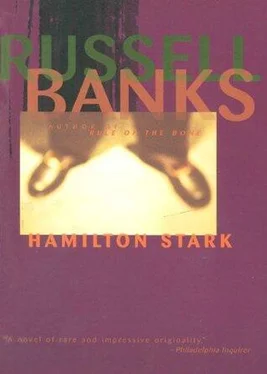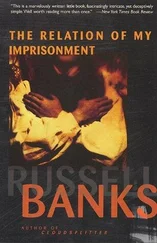Chapter 3. Three Tales from His Childhood
TRUTHFULLY, I planned from the beginning to bring into the narrative at precisely this point Rochelle’s version of three tales told to her by her father when she was a child. Or at least that is what she claims. It’s quite possible that she invented them herself (quite unlike her, however; her methods of composition depend heavily on observation and memory; she leaves formalism, fantasy, hallucination, meditation, etc., to others).
Let us think of this sequence of tales as coming from Rochelle’s own novel about her father, a project I will describe and speculate on in some detail later. At this moment I am concerned with her lovely, fragile ambivalence toward her father, a man she believes is either a demon himself or is merely possessed by one. I am also concerned that she believes it was not always true that her father either is a demon or is possessed by one. She believes that when she was a child, a young child, but one of indeterminate age, it seemed to her that her father loved her. That’s very important. It may be the hinge of her ambivalence. These tales are important to her (important to me for other reasons, which doubtless will soon become apparent) because it seemed to her that her father never loved her as much again as when he would take her like a flower into the curl of his huge arm and, at her urging, tell her tales from his childhood. Or so she believes.
Only three of those tales from the many that he told her remain with her today, perhaps because, above all his other stories, it was these three that bore significance for him, telling them, as he apparently did, three and four times over, when he never repeated any other tale even once. And too, it may be only that these three bore significance, later, for Rochelle herself, when, as emblems of an as-yet-unrevealed future, they foretold either the name of the demon he would become or the name of the demon who became him. Regardless, it was with stories such as these, tales from his childhood, that she first learned to perceive her father’s present perfected state (her very words), and that is the context in which, in her attempt at a novel, she offered them to others. It is not, of course, the context provided here, in spite of the fact that the prose style and narrative form are strictly Rochelle’s. The context offered here, my personal contribution, is merely the frame.
THE FIGHTING COCKS
Every morning Hamilton Stark [in Rochelle’s ms., this character is named Alvin Stock; for obvious reasons, I have substituted the name of the person she was really writing about. More on this later. The author.] fed and watered his father’s fighting cocks. His father had told him that it was his “job,” and for doing it Ham received every Sunday a small amount of money, which his father told him was called an “allowance.”
Ham also had to feed and water the chickens, but because he enjoyed doing that, he didn’t consider it part of his “job.” He had chosen a name for each of the ten hens, and whenever he discovered a gravel-colored egg in one of the nests, he thanked whichever bird had laid it, saying quietly in the dusty light of the henhouse, “Thank you, Amy. Thank you, Jane. Thank you, Harriet.”
Living in the henhouse with the hens was a fat old rooster named Henry. He was a Rhode Island red, like the hens. To Ham, Henry seemed shy, especially compared to the fighting cocks, because he only crowed twice a day, at sunrise and sunset, and quietly at that (unlike the fighting cocks, who crowed loudly and constantly). Ham liked Henry, and in spite of his shyness, Henry seemed pretty friendly toward Ham too. Not as friendly as the hens, maybe, but surely more friendly than those fighting cocks.
They were bantam fighting cocks, half the size of Henry and the other Rhode Island reds, but so fierce they had to be kept inside wire mesh cages in their own special corner of the henhouse. Also, they had their own caged sections of the henyard, which they got to in warm weather by way of their own little doorways. There were only two of them, and Ham’s father had named them Jack and Gene, after two famous boxers. “All these guys know is fighting,” he had said. “You wouldn’t want me to name them after a couple of violin players, would you?”
The fighting cocks made Ham’s father happy. He had brought them home with him, their cages stashed in the back of his pickup truck, early one summer evening, after having spent several hours in Pittsfield at the Bonnie Aire Café with some friends. He had bought them from a man he had met there, a lumberman from Canada who was going out west by train and couldn’t take them with him.
That first night Ham’s father had talked excitedly about staging cockfights with Jack and Gene. Even though he’d never actually seen a cockfight, he figured there wasn’t much to it once you had a pair of fighting cocks. Ham’s mother said that she really wasn’t interested in anything that had to do with animals such as that, and she had gone into the kitchen to wash the supper dishes. Then Ham’s father had fallen asleep in his chair by the radio.
As soon as he realized that his father had fallen asleep, Ham crept over to the cages, which his father had placed on the floor next to his easy chair, and he studied the strange-looking birds. The one named Jack was red, the one named Gene was yellow, and they both looked fiery — fast, sharp, sudden little birds with wildly round eyes, short orange combs, beaks like the points of scissors, and long knifelike spurs attached to the backs of their legs. They reminded Ham of snakes — their cold, unblinking eyes, the way they held their bodies motionless while they watched him, always from the side, turning only their wedge-shaped heads as Ham moved in a careful circle around their cages.
Finally he sat down on the floor next to the cages. His father was snoring. Reaching out one hand, Ham brushed the top of Jack’s cage and quickly yanked his hand back. The bird didn’t move. Trying the same thing with Gene, he joggled the cage a bit, knocking the bird off-balance for a second, but getting no other response from it. Moving back to Jack’s cage, he once again reached toward the mesh, and just as he felt the touch of the cold wire against his fingertips, he realized that the bird had lanced the palm of his hand with its beak, and a hot flower of pain filled his hand and shot up the length of his arm.
He screamed, and his father woke up, and his mother came running in from the kitchen. Blood was pouring from a small hole in the palm of his hand all over his flannel pajamas and bare feet. Ham kept screaming and slapping his hand against himself as if a tiny spot of fire were stuck to it.
Wrapping his hand with the dishcloth she had been carrying, his mother hurried him upstairs to the bathroom, where, after a while, she was able to calm him and wash and dress his wound. Then she took him into his room and helped him put on a clean pair of pajamas and tucked him into bed.
Kissing him good-night, she said, “Don’t be afraid,” in a voice that helped him not to be afraid, because it was a voice that told him she was not afraid.
Then she went downstairs, and he could hear her talking to his father, though he could not hear the words. Several times his father interrupted her, but she quickly resumed talking.
After a few minutes his father started talking, and his mother began to interrupt, but he kept on talking in his low, steady voice. And when he finished, he left the living room and came into the hall and started up the stairs.
He came into Ham’s room and sat down at the foot of the bed. “Let me see your hand, son.”
Ham extended his gauze-wrapped hand to his father, who examined the dressing for a second, then returned it. “Still hurt?”
Читать дальше












